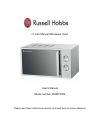
¾ Do not use the oven for any reason other than preparing food, such as for drying
clothes, paper or any other non-food items, or for sterilizing purposes.
¾ Do not use the oven when it is empty. This could damage the oven.
¾ Do not store anything in the oven, such as papers, cookbooks and so on.
¾ Do not cook any food surrounded by a membrane, such as egg yolks, potatoes,
chicken livers, ready meals and so on without piercing them several times with a
fork.
¾ Eggs in their shell and whole hard-boiled eggs should not be heated in microwave
ovens since they may explode, even after microwave heating has ended
¾ Never put any objects into the openings on the outer case.
¾ Never remove parts from the oven such as the feet, screws and so on.
¾ You should use microwave utensils only in line with these instructions.
¾ Do not try to deep-fry foods in this oven.
¾ When heating food in plastic or paper containers, keep an eye on the oven due to the
possibility of ignition
¾ Heat from the contents of a container may be transmitted to the container itself, so
please be careful when removing it from the oven. Please remember that the food or
liquid inside will be releasing some steam of will be spitting. Never cover any
container fully, always leave a gap for the steam to escape.
¾ Microwave heating of beverages can result in delayed eruptive boiling, Therefore
care must be taken when handling the container.
¾ Cooking utensils may become hot because of heat transferred from the heated food.
This is especially true if plastic wrap has been covering the top and handles of the
utensil. You may need oven gloves to handle the utensil.
¾ The contents of feeding bottles and baby food jars shall be stirred or shaken and the
temperature checked before consumption, in order to avoid burns.
¾ Always test the temperature of cooked food, never eat or drink food or liquid straight
from the oven, allow it to stand for a few minutes and stir to distribute the heat evenly.
¾ Food containing a mixture of fat and water (for example, stock) should stand for 30 to
60 seconds in the oven after it has been turned off. This is to allow the mixture to
settle and to prevent it from bubbling when a spoon is placed in it, or a stock cube is
added.
¾ When heating or cooking food or liquid, remember that there are certain foods (such
as Christmas puddings, jam and mincemeat) which heat up very quickly.
¾ When heating or cooking food that contain a lot of fat or sugar, do not use plastic
containers.
¾ Always have the glass tray and turntable support in place when using the oven.
¾ Do not cook food directly on the glass tray. Put food on a suitable plate or in a bowl
before putting it in the oven.
¾ Keep the waveguide cover clean at all times. Wipe the oven interior with a soft damp
cloth after each use. If you leave grease or fat anywhere in the cavity it may overheat,
smoke or even catch fire when next using the oven.
Important Safety instructions















